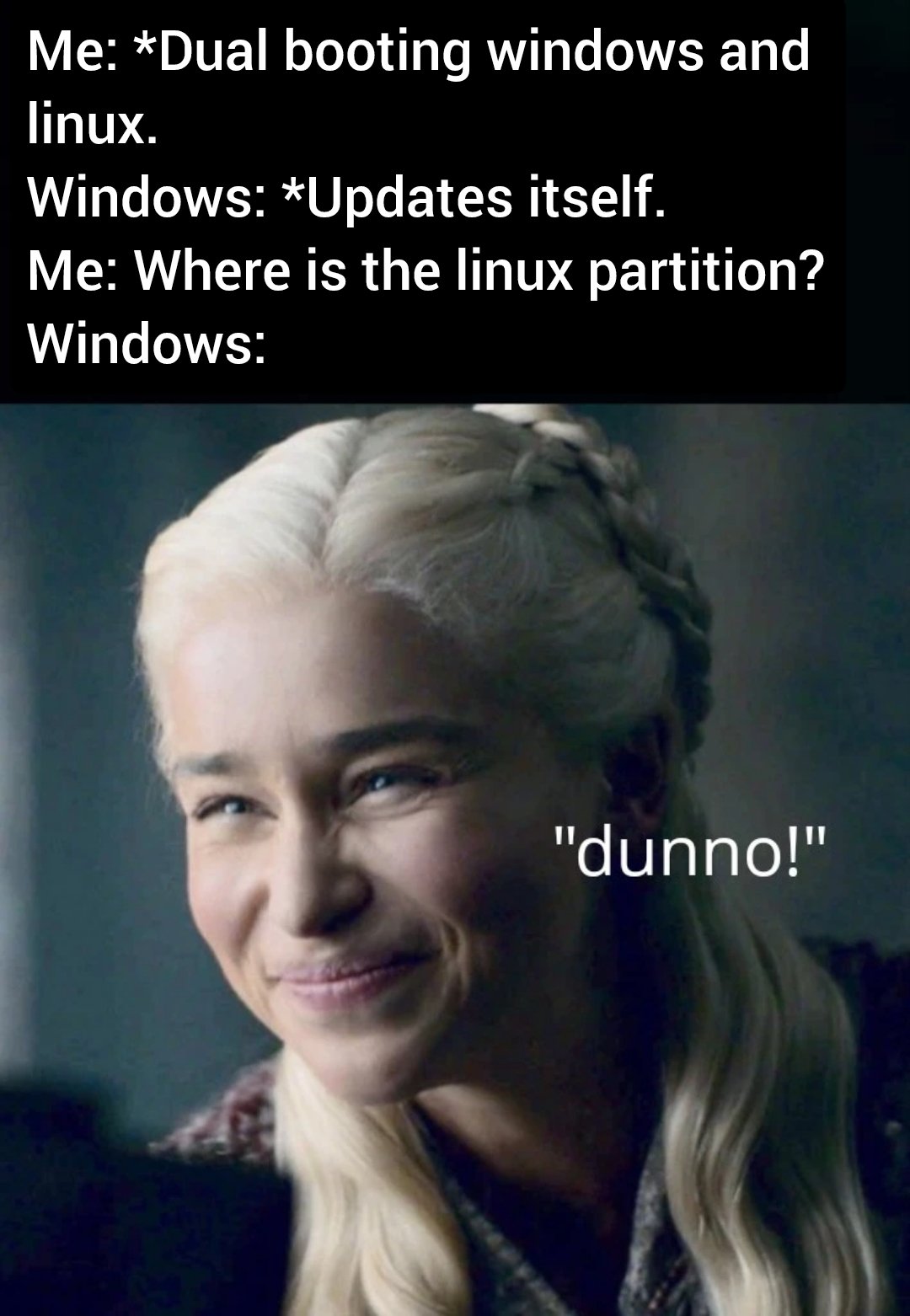this post was submitted on 27 Sep 2023
662 points (94.3% liked)
linuxmemes
21172 readers
987 users here now
Hint: :q!
Sister communities:
- LemmyMemes: Memes
- LemmyShitpost: Anything and everything goes.
- RISA: Star Trek memes and shitposts
Community rules (click to expand)
1. Follow the site-wide rules
- Instance-wide TOS: https://legal.lemmy.world/tos/
- Lemmy code of conduct: https://join-lemmy.org/docs/code_of_conduct.html
2. Be civil
- Understand the difference between a joke and an insult.
- Do not harrass or attack members of the community for any reason.
- Leave remarks of "peasantry" to the PCMR community. If you dislike an OS/service/application, attack the thing you dislike, not the individuals who use it. Some people may not have a choice.
- Bigotry will not be tolerated.
- These rules are somewhat loosened when the subject is a public figure. Still, do not attack their person or incite harrassment.
3. Post Linux-related content
- Including Unix and BSD.
- Non-Linux content is acceptable as long as it makes a reference to Linux. For example, the poorly made mockery of
sudoin Windows. - No porn. Even if you watch it on a Linux machine.
4. No recent reposts
- Everybody uses Arch btw, can't quit Vim, and wants to interject for a moment. You can stop now.
Please report posts and comments that break these rules!
founded 1 year ago
MODERATORS
you are viewing a single comment's thread
view the rest of the comments
view the rest of the comments

With EFI systems this doesn't matter. It was an issue with the legacy BIOS bootloader systems about a decade ago though.
I don't remember if Windows updates would cause it but installing Windows second definitely would. Likewise, I think upgrading (from say Windows 7 to 10) might. Basically Windows is just like "this MBR? It's actually mine, thanks." With no option to not erase it.
EFI systems don't use the MBR. Windows will default to using the whole disk if you don't use the "advanced" button, but so will most linux distro installers.
Correct. But Windows is not changing the BIOS boot order. It will however change your EFI to make itself the default boot again, even if you configured it to use a separate ESP on a completely separate disk and the boot menu residing there. That's by design as you can access your efi settings from a running system via software, while your chances to change your BIOS settings from outside the BIOS are slim to non-existent.
Also every BIOS not decades old can indead run with a hybrid setup of GPT formated disk with a small partiton to replace the MBR functionality.
I'm talking about BIOS, yeah, sorry if it was unclear. My 2009 CPU is still hanging on. Barely.
2009 usually means you could indeed run it without an MBR: GPT format plus a very small (2MB) partition flagged to take over the functionality of containing a bootloader normally embedded in the MBR.
Pretty sure it happened to me on UEFI as well
In fact old BIOS systems are more resilient. With a separate bootload on another disk, starting from that disk and then chainloading Windows (on another disk) or Linux works very stable as Windows is not trying to change the boot order of BIOS.
But Windows likes to also meddle with UEFI. Even with separate disks each with their own ESP it likes to change you EFI settings to make windows the default again instead of the boot menu on another disk (everything on the same single ESP is even worse, because then Windows can access and delete everything now Windows and you have to restore the boot loader/menu).